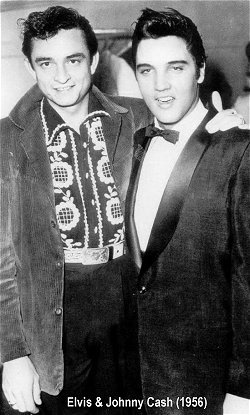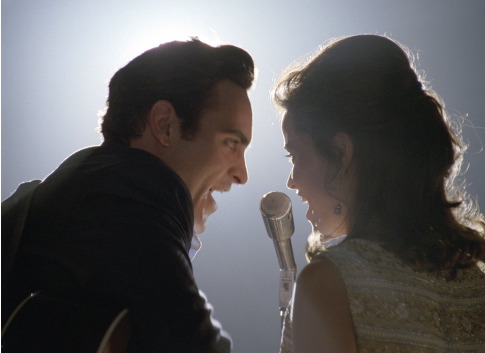Walk the Line
11/19/2005 00:51 Filed in: Movies and Television

Johnny Cash: "Then they're not really Christians."
As far back as I can remember, Johnny Cash was a part of my personal culture. I don't remember a time in my life when I didn't know who he was. I still recall standing in a circle with classmates and my teacher when I was in kindergarten. She was letting us suggest songs and then we were singing them together. One little boy spoke up and said, "Oh, I know a song by Johnny Cash!" We all stared at him waiting. After a few seconds of racking his brain, he said, "It's something about a train."
In the last decade or so, I "rediscovered" Johnny Cash and have a number of his albums, including the famous "Live at Folsom Prison." Johnny Cash is like Billy Graham. Cash doesn't have a perfect voice, and Graham is not the most eloquent preacher you'll ever hear. Yet, both are extremely powerful when they use the abilities God gave them. Johnny Cash has the unique ability to connect to all kinds of people from all different walks of life. Whether listening to the live recording from Folsom Prison (1968) or his last album, "American IV: The Man Comes Around" (2002), Cash has the power to move you with his sometimes raspy, sometimes off-key voice. He sings about life. He sings about mistakes. He sings about faith and redemption.

As I said, this movie is a redemption story, and as such, at times it was hard for me to watch. Why? Well, if the timeline in the movie is fairly accurate, Cash began to clean up his life in the late sixties. I was born in 1967, and I never had the image of Johnny Cash as the carouser who was arrested for drug possession. For me Johnny Cash has always been this great legendary performer who sang about real life and occasionally performed at Billy Graham crusades. In order for redemption to take place in the movie, we have to witness Cash's self-destructive downward spiral into alcohol and drug abuse, infidelity, and a failed marriage. The second act of Walk the Line is certainly not rip-roaring fun for the audience because most of us admired the man and feel a connection to him. Yet, it's significant that before he died, Cash was involved in this project from the beginning--down to his personal selection of Joaquin Phoenix to portray him in the movie. As unflattering as some of the events in his life were, I think that if he were alive today, Johnny Cash would approve of the final product. There were no skeletons in his closet because everything was out in the open. He was not perfect man, and he never attempted to portray himself that way. Perhaps that's why his music is so real and why we enjoy it so much.
As I mentioned, Joaquin Phoenix was personally selected for the role by Johnny Cash himself, reportedly after Cash saw Phoenix's performance in Gladiator. Although I don't know if I ever fully thought that I was seeing Johnny Cash instead of Phoenix in his portrayal, the latter is to be commended for his performance. Not only does he sing the Cash songs himself instead of relying on dubbed tracks, he even learned how to play guitar for this part. In fact, his best times of portrayal are when he performs. He has the Cash stare down, the tilt of the head back before launching into a song. He even holds his guitar in Cash's trademark style that looked more like he was firing a shotgun than playing a musical instrument.

Incidentally, I read a couple of weeks ago that Kathy Cash, Johnny's daughter from his marriage with his first wife, was displeased with the movie because she "said the film unfairly shows her mother, Vivian Liberto Distin, Johnny Cash's first wife, as a shrew." Granted, it's not my mother being being portrayed in the film, but Cash's first wife did not come across to me like that at all. If anything she is portrayed as a victim of Cash's earlier indiscretions.
With limited budget and my return to the life of a student, this was the first movie we'd seen in a few months, but one that I eagerly anticipated. My favorite parts were the performances, and I felt this was where Phoenix really shined. If you are considering seeing this movie with children, take the PG-13 rating seriously. Drug and alcohol abuse and marital infidelity are portrayed very realistically. And of course, like any movie portraying this era in American history, everyone smokes cigarettes.
But after you see Walk the Line, go listen to some authentic Johnny Cash recordings. Odds are, after seeing his real-life story, you will hear the words in his ballads in a different light and with new appreciation.









